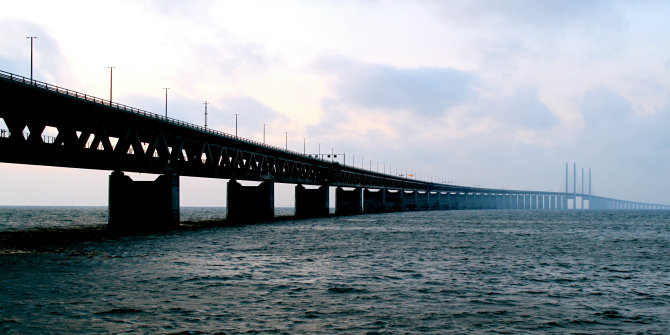The Spanish government regards the planned Catalan independence referendum as being unconstitutional, but supporters of the referendum have argued that Catalonia should have a legal right to hold the vote. Domenico Giannino states that although both sides have made legal arguments, it is a situation that can only be solved by political negotiations. The crisis also demonstrates a wider process under which national authorities are increasingly finding their powers constrained by the actions of both supranational and subnational actors.
Credit: Nicolas Grevet (CC BY-NC-SA 2.0)
Sunday, 1 October, will be a pivotal moment in Spanish constitutional history due to the now famous Catalan law regulating the holding of a binding self-determination referendum on the independence of Catalonia (Llei del referèndum d’autodeterminació). The law was the climax of almost ten years of Catalonia’s drift toward independence, which started with the massive 2010 Catalan autonomy protest.
Theodore Roosevelt famously stated that “the more you know about the past, the better you are prepared for the future”; in the case of the Catalan independence referendum, the past is represented by the issues related to the Catalan Statute of Autonomy (Estatuto de Autonomía de Cataluña). This was approved by the Catalan Parliament on September 2005 with a majority of 88% (only the Spanish Popular Party voted against) and sent to the national Parliament for approval by law. The national legislative assembly strongly amended the Statute of Autonomy, leading some observers such as Roberto Blanco Valdes to regard it as being little more than apocryphal, and the turnout for the confirmative referendum was relatively low.
The icing on the cake came from the Spanish Constitutional Tribunal, which took a highly restrictive interpretation of the Statute of Autonomy. There were sharp political reactions in Catalonia against this judgment, culminating in a massive autonomy protest in July 2010 under the slogan “Som una nació. Nosaltres decidim” (We are a nation. We decide).
In the following years – as history often repeats itself – it was again the Spanish Constitutional Tribunal who led the ‘Catalan performance’, at least from a legal point of view. In March 2014, the Constitutional Court ruled against the Declaration on the Sovereignty and Right to Decide of the People of Catalonia, recognising – within the Spanish constitutional framework – the right to decide, which cannot be extended to self-determination. Finally, the court ruled – on 7 September – not only to suspend the Catalan referendum law, approved by the parliament of the Generalitat of Catalonia, but also to personally warn the 948 Catalan mayors and 62 senior officials of the Generalitat that they cannot participate in the organisation of the referendum.
The legal aspects of the referendum are simpler than the political debate suggests. The Spanish and Catalan governments are clearly fighting a media battle where there is no room for truth. The tension between national police and demonstrators, after the arrest of some Catalan officials, shows that both governments are playing a dangerous game that can easily spiral out of control. However, the ‘false truth’ of the Spanish government is undoubtedly built – whether we like it or not – on strong legal and constitutional grounds.
First, in the Spanish legal system calling referendums are a competence of the central government, consequently the Catalan government did not have the constitutional power to approve the Llei del referèndum d’autodeterminació. Furthermore, even if the referendum had been legal, it would have been only advisory and consultative.
Second, in international law, far less in EU law, it is difficult to find rational legal grounds to support the referendum. On the other hand, as some legal observers have noted, this is an unprecedented event and there is a case for saying that we should not use 20th century international law to address 21st century issues. The legal system should not be used to solve political problems, and a serious and fair political negotiation is clearly the only way out from the crisis.
The Catalan case also suggests the possibility of a new scenario emerging for Europe. This is the first time that an EU region will act against the democratic constitutional order of its own state using a referendum which has been deemed unconstitutional, has been called on a unilateral basis, and is not recognised by any other state. The question for Europe is whether this challenge will be confined to Spain alone, or whether it will feed into a wider process of legal ‘glocalisation’, under which national governments simultaneously find their powers challenged from both supranational organisations and subnational entities.
Please read our comments policy before commenting.
Note: This article gives the views of the author, not the position of EUROPP – European Politics and Policy or the London School of Economics.
_________________________________
Domenico Giannino
Domenico Giannino has a PhD in Public Comparative Law from the University of Calabria. He is an Associate Lecturer at London Met, and a Law Module leader at Kaplan International College.






“in the Spanish legal system calling referendums are a competence of the central government”
Is this actually true?
Surely it would be surprising if there was no facility for Spanish municipalities to conduct polls, surveys or similar?
According to Wikipedia:
“Principal authorities in Great Britain have the ability to hold an advisory referendum on any issue relating to its services, financial provisions, and other matters that are relevant to the area.[9] The power for principal local authorities to hold a poll within England and Wales is specifically granted by the Local Government Act 2003;”
It would be astonishing – and profoundly anti-democratic if there was no vehicle for the Catalan people to express their desires.
“even if the referendum had been legal, it would have been only advisory and consultative.”
How does the author know? Presumably because there IS a mechanism of sorts.
The Catalans may be foolish.
The Madrid government may not like the vote.
They may say that it is not binding.
But to use the full force of the State to obstruct democratic expression is shameful.
Having lived in Canada during two such secession referendums, it is apparent to me that the Spanish central government has made a serious blunder in trying to prevent the referendum from taking place by legalistic methods and the use of force. Before this latest commotion, it was unclear that secession had majority support in Catalonia. An open referendum peacefully contested on the merits of the question may well have ended in a no vote. In addition, the pro-independence party would probably have softened its question prior to a vote, just as the Quebec separatists did. The separatists lost, even if very narrowly, but now there is no threat to Canadian unity for the foreseeable future, and the Federal parliament has demanded that any further such referendum would require a clear question and a clear majority. The Spanish government has, unfortunately, simply got the Catalans’ backs up.
Hi Jules,
sorry for the late answer but I have been quite buy. I do believe a political negotiation is the only solution for this crisis. The referendum was the typical lose-lose scenario: Spain lost because the political blindness of its government; the Catalan government lost because the illegal conduct of its government.
I am sure Wikipedia can help you to find out what kind of binding referenda there are in the Spanish legal system.
Best
D.G.